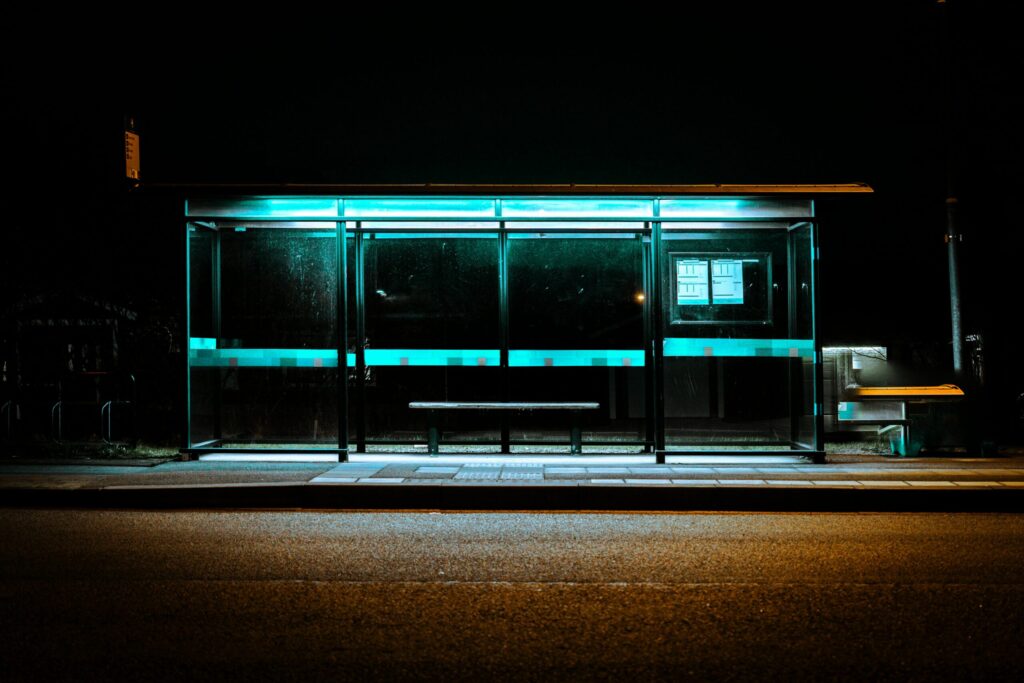
Photo by Lorenzo Manera
While scrolling on my Google news feed the other night, I stumbled upon this news headline that stopped me in my tracks:
“MARTA bus leaves disabled passenger stranded at late-night Vine City station”
“It was too late for me to be out here. I was terrified,” Jackson told Channel 2’s Tom Jones on Channel 2 Action News at 6 p.m.
WSB Atlanta 2 News Now
Read and watch story, here.
I knew what the above story would be about just by reading that news headline alone. If you or someone you know with a physical disability depends on paratransit services, you fully understand that this lifeline—which provides vital accessibility—can feel like a Catch-22 at the exact same time. It’s a service we need to live, but one that ultimately restricts our freedom and often jeopardizes our safety. This terrifying truth hit home immediately, because this moment wasn’t just a distant headline—it was my own reality a few years ago.
It was Fall semester, and I was attending classes at Durham Technical Community College. This was during the “Fall Back” time change, meaning that by 5:00 PM, the lack of light made it feel like 10:00 PM. Evening classes were starting, so the building I was waiting at was still busy with students and staff coming and going. Knowing the school was still open while I waited for my scheduled paratransit ride to take me to my nice, warm apartment, I felt reasonably safe for the time being.
About an hour went by, and there was still no sign of my ride. I had called the dispatch line right after class, around 5:00 PM. The dispatcher informed me my driver was running a little late but would be on the way as soon as possible. I responded politely, “Okay, thank you for letting me know!” But as I hung up and closed my flip phone, I thought to myself, typical. This was definitely not the first time my paratransit van had been late. (And, as I type this in the year 2025, it certainly has not been the last!)
I’m sure most people who depend on paratransit will not admit it out loud, but waiting on these services comes with a deep sense of embarrassment. I know it may sound silly, but as I waited outside that night, two or three people who went in and out of the building stopped to ask if I was okay. I would tell them I was fine and hold up my flip phone to signal that I was in touch with my driver and they were just running late—that this was normal.
Please don’t misunderstand my hesitation; I deeply appreciate the genuine human kindness of those who stopped to check on me. We need more people in the world to look out for one another. However, that kindness doesn’t erase the underlying systemic failure. It is embarrassing because the system of accessible transportation designed to ensure my independence is the very thing that abandoned me, forcing me into a position of vulnerability. They weren’t checking on a disabled person having a bad day; they were checking on a victim of inadequate public services. They would politely suggest I go inside because it was getting colder. But I would tell them that I preferred to stay outside—because once the van finally did show up, I didn’t want the driver to have an excuse to say they couldn’t see me because I was inside trying to stay warm. Believe me, this has happened before to one of my best friends who also depends on paratransit services. And I assume this is exactly what the poor woman in the news story went through.
I eventually was picked up around 7:00 PM, two hours after my original 5:00 PM pickup time. Not only did this delay leave me cold and embarrassed, it created a ripple effect: I had a CNA waiting for me at my apartment to help me take a shower, eat dinner, and get me into bed before her shift ended at 9:00 PM.
I am truly grateful for the paratransit service I receive and for the kindness of every person who stopped to check on me that cold evening. I also understand the complexity of the service: drivers are navigating multi-stop routes across a large area, which is what causes the delays. This is not a complaint about traffic or a lack of appreciation for the service itself.
This is a demand for equality.
The problem is that it is now 2025, and this singular, often rigid service is still the only reliable option for so many of us who rely on power chairs. Our gratitude should not be mistaken for acceptance of a system that forces us to choose between living a full adult life and maintaining our safety. People with disabilities are not homebound children anymore. We don’t just want to go out for a day trip and be back home before 7:00 PM; we are adults with varied social lives and interests. We deserve to have the same transportation flexibility as our able-bodied peers—to go out at different times, to attend a late event, or to take a spontaneous, last-minute trip.
The current system reflects an outdated view that sees people with disabilities as waiting to be taken care of and put to bed. We deserve to be treated like the autonomous, active adults we are. We demand more options, especially for last-minute and late-night trips, so no one is left vulnerable in the dark.
The Solution: Moving Beyond the Catch-22.
It is true that accessible transportation options do exist. We have necessary city paratransit services, and most city bus systems are accessible. Furthermore, rideshare companies like Uber and Lyft have bravely rolled out their WAV (Wheelchair Accessible Vehicle) programs in select cities, offering the promise of on-demand transportation right from a smartphone.
But as my story and the Atlanta tragedy prove, it is still not enough. These services are a fragmented patchwork that fails to cover the need for last-minute, late-night, and spontaneous travel—the very flexibility that our able-bodied peers take for granted. We cannot be held hostage by a 9:30 PM curfew on a sunday just because we use a power chair.
The path to change lies in addressing the two major barriers to expanding on-demand, flexible accessible transportation: It is true that accessible transportation options do exist. We have necessary city paratransit services, and most city bus systems are accessible. Furthermore, rideshare companies like Uber and Lyft have bravely rolled out their WAV (Wheelchair Accessible Vehicle) programs in select cities, offering the promise of on-demand transportation right from a smartphone.
The path to change lies in addressing the two major barriers to expanding on-demand, flexible accessible transportation:
Demand and Incentives.
1. Generate the Demand
Rideshare platforms, by their very nature, require a large fleet of specialized vehicles and certified drivers to operate WAV services effectively. The services are only widely available in areas where market conditions and operational requirements can be met. We need to demonstrate that the true need for this service is massive.
- Uber WAV Program Requirements: Learn more about Uber WAV’s requirements and goals here.
- Lyft WAV Program Areas: See where Lyft Wheelchair rides are currently available and how to request them.
If the market doesn’t appear large enough to support the high costs and effort involved, the services won’t expand. We need to prove the demand exists and is growing.
- Action: Contact Your Elected Officials. Direct change starts with your vote and your voice. Find your U.S. House Representative here: https://www.house.gov/representatives. Use this tool to contact their office and tell them that federal funding for accessible transportation—both in public transit and private partnerships—must be a priority.
- Action: Document every single time you need a ride and cannot get one because of accessibility issues or late hours. Share your data with local disability advocacy groups and transportation authorities to create a quantifiable case for change.
2. Fund the Solution: Incentivize Drivers and Training
The primary logistical barrier is the high cost of purchasing and maintaining a WAV and the shortage of drivers willing to operate them. We need to advocate for incentives that make driving a WAV a financially attractive option.
- Action: Demand that your local government dedicate funding to subsidize WAV purchases for independent contractors and small businesses. This is not charity; it is an investment in equitable infrastructure.
- Action: Support advocacy groups that are pushing for public-private partnerships to fund specialized training for drivers on safely assisting and securing all types of wheelchairs. Reliability is a safety issue.
We are not asking to be taken care of; we are demanding the freedom to live our lives—to work late, to attend a friend’s party, or to spontaneously decide to go to a game night without the fear of being stranded in the dark. It is time for our transportation systems to catch up to the reality of the active, modern lives of people with disabilities.
Until next time, be wise, stay safe, support & respect one another!
~Jennifer aka “Wheelchair Detective” 💚
#WheelchairDetective #Catch22 #DisabilityJustice #AccessibleTransit #UberWAV #LyftWAV #AccessIsSafety #advocacy #disabilityinclusion #paratransit #travel #transportationservices #wheelchairlife #wheelchairaccessible #atlanta


Leave a Reply